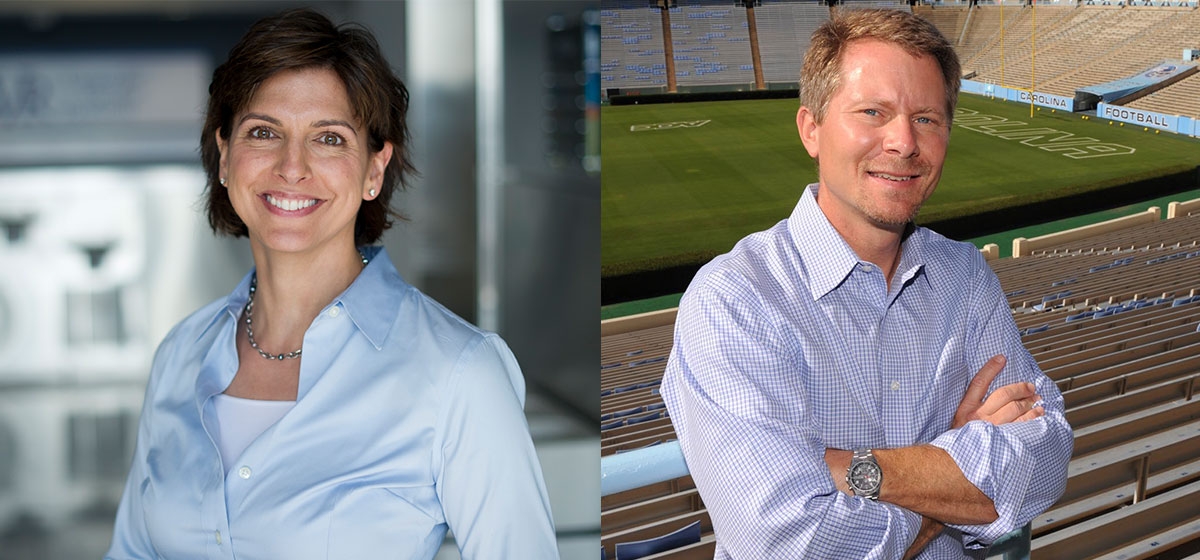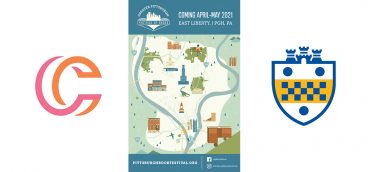The Genius of Pitt

Kevin Guskiewicz has been called a genius for discovering the link between on-field head hits to football players and damage to their brains; findings that once put him at odds with the mighty National Football League.
But here’s the thing about the Latrobe native, who recently won a 2011 MacArthur Fellowship, commonly called a “genius” grant, for his concussion research. He lets his three sons—ages 15, 13 and 11—play this rough-and-tumble sport while he coaches from the sidelines.
“Why would you let your kids play football?” people ask Guskiewicz, the Kenan Distinguished Professor in the Department of Exercise & Sports Science at the University of North Carolina. He’s used to that question. Barely a day goes by when he doesn’t hear it.
The soft-spoken researcher understands the irony. After all, his own studies link multiple concussions to cognitive impairment, depression and early Alzheimer’s disease. Head injuries may have factored into the death of former Steeler Mike Webster and the struggles of ex-New York Jet Al Toon. Why let your own kids engage in the same helmet-smashing, neck-snapping, gridiron combat that downed some hulking NFL superstars?
Guskiewicz, a former Steelers trainer and alumnus of the University of Pittsburgh, replies that he wants to teach his sons how to play a contact sport while minimizing the risk of concussion. “You can learn proper tackling and blocking techniques and you are best equipped to develop those skills at a younger age.”
Guskiewicz teaches kids how to brace their bodies and be aware of their surroundings. “Rather than lowering your head and loading inappropriately with your head, you want to keep your eyes facing forward and your head up instead of down.”
In fact, the 45-year-old will devote part of the $500,000, no-strings-attached MacArthur award, paid over five years, to making youth football programs safer.
He plans to develop a less expensive system than the one he helped implement at UNC, in which accelerometers inside helmets measure the force and location of head impact in real time. While sports concussions are not always preventable, he said, the odds of getting one can be greatly reduced.
Despite his former clashes with the NFL, Guskiewicz never lost his love of the game. He grew up in Latrobe, where watching football seemed like a residency requirement. “We still claim to be the birthplace of professional football, even though Canton debates us for it,” he said.
He got his first concussion playing junior-high football. (The two others occurred as an adult after he flipped over his bicycle handlebars on a trail and was jerked around on a roller coaster). But the dazed state he felt after his concussions had nothing to do with his career path. From 1990 to 1992, while working on a master’s in sports medicine at the University of Pittsburgh, he held a coveted job as a Steelers trainer.
He was troubled by the hard, stars-inducing hits the players took and the lack of a standard league policy on treating concussions. “The Steelers were probably taking care of concussions better than anyone in the league. Their medical staff is still the most respected in the league as far as managing concussions. But it bothered me that decisions were made in an arbitrary way throughout the league.”
The case of Al Toon, the New York Jets’ star wide receiver whose career was cut short by a spate of concussions, drew attention to the issue.
At UNC’s Center for the Study of Retired Athletes, which Guskiewicz helped start in 2001, he and his team studied 2,800 retired athletes and found that those who had sustained three or more concussions were three times more likely to be diagnosed with depression and five times more likely to be diagnosed with mild cognitive impairment (a precursor to Alzheimer’s disease) than those with no concussion history.
Several members of the league’s previous concussion committee said they did not believe the findings linking prior concussions and risk for dementia and depression. At a 2007 meeting in Chicago hosted by the NFL, those committee members reiterated their doubts. “That was the catalyst,” Guskiewicz said. “We were a thorn in the side of the NFL. A few physicians frankly were trying to protect the image of the league and dismiss our findings.”
To those who argued the links had not been proven, Guskiewicz would counter: “As medical professionals, we all have been trained to err on the side of caution. How can you responsibly sit across the table from a player who has had three or four concussions and say they don’t have risk when it has been suggested they probably do?”
He said the league’s attitude changed when Roger Goodell was named NFL commissioner. In 2010, he offered Guskiewicz a seat on the NFL’s Head, Neck and Spine Committee. Guskiewicz now sits on the panel alongside his friend, former Steeler Merril Hoge.
“I preach it to graduate students,” Guskiewicz said. “When you are right and integrity is intact, stay the course. You will make a difference. That is why I feel good about the MacArthur grant. We did not walk away when my group was being attacked by a very big industry. We still have a lot more to learn. What we learned was an important building block.”
His work goes beyond football. The MacArthur fellowship will allow him to study the impact of blast injuries on soldiers at Fort Bragg. “They are a lot like sports injuries,” he said. “We get them back to combat too soon.” His friend, John Norwig, head athletic trainer at the Pittsburgh Steelers, said Guskiewicz “fostered an acknowledgement that mild traumatic brain injury is real in all phases of athletics, from peewee football to girls’ lacrosse to the NFL to cheerleading.”
For all his accomplishments, Guskiewicz doesn’t let the genius moniker go to his head. “If any of you call me a genius,” he tells his Latrobe buddies, “I am going to bring you in for a concussion evaluation.”
Clues of Pathogens
In 1999, Elodie Ghedin traveled to Senegal to study water quality in remote villages. As she drew samples from the Lac de Guiers, she was startled to see children with distended bellies bathing in a lake nearby. Ghedin knew there was malnutrition here in western Africa, but she suspected another cause as she stared down at her safety gloves while the children splashed around, unprotected.
They were open targets for parasites. “Wow, these children are constantly and completely exposed,” she thought to herself. A parasite may have enlarged their spleens, pushing out their stomachs.
The misery of those West Africans has haunted her ever since, revealing a passion for unraveling the confounding properties of parasites and viruses. Ghedin, now a University of Pittsburgh parasitologist and virologist, decodes the genetic sequence of some of the most virulent human pathogens, especially tropical diseases such as leishmaniasis, sleeping sickness, Chagas disease, elephantiasis, and river blindness.
For her research in studying neglected diseases in developing nations, she has been named a 2011 MacArthur fellow. To say that she was surprised by her so-called “genius grant” is an understatement.
“It feels unreal,” said Ghedin, assistant professor at the Center for Vaccine Research at the Department of Computational and Systems Biology at Pitt. Ghedin, 44, lets out her easy laugh. “No, no, no. It’s not a real genius award.”
She almost deleted the email that gave her the first hint that Sept. 9, 2011 would not be a typical day at the job. Her inbox had been clogged with scams that began, “We have money for you, my dearest…” She figured that an odd email—someone named Bob Galluci was asking her to call him—was more of the same. There was no affiliation.
“Look at the stuff I have been getting all week. It is so weird,” she told her assistant.
Before she could hit the delete button, her assistant said, “No wait, wait.” The email address looked legit.
Upon Googling the name, Ghedin discovered that Robert Gallucci was president of the MacArthur Foundation. She returned the call, and during the three hours she waited for a callback, her mind raced. No, it’s impossible. I could not have won a MacArthur fellowship. But wouldn’t that be nice if I did? But it can’t be me.
Her colleague, Eddie Holmes, professor of biology at Penn State University, wasn’t the least bit surprised she was one of the 22 MacArthur fellows named this year. “Elodie is the best in the business at what she does—the complete sequencing of genomes—be it in viruses or worms. You know when you do work with her, it is the absolute best standard.” The MacArthur “genius award” is akin to an Oscar for an actor, he said. “Actually, it is probably more prestigious than an Oscar. They give out more Oscars every year.” He said Ghedin is the rare scientist who can zero in on the most minute technical details while seeing the larger pattern.
“She is the world’s best at solving technical issues. But she understands the theory and is very innovative. People say there are architects and builders. Elodie can do both. She can design the house and build it really well, so to speak.”
Ghedin said a successful molecular biologist “gets excited by the smallest little thing. You really have to dig in and repeat information. We joke that a molecular biology project should be doable in a couple of months. It always takes a year. Nothing ever works. You just go, ‘Oh well, it happens.’ If you get depressed by things not working, you are in the wrong field.”
From the time she was a girl growing up in Montreal, she was fascinated by the tiniest details she saw through her microscope from the science kits her parents bought. An inspiring eighth-grade science teacher made her even more convinced to become a biologist.
After graduating from McGill University with a B.S. in biology, she received her master’s in 1993 from the Université du Québec à Montréal. Upon returning from her field work in Senegal, she returned to McGill University to get her doctorate and work in the Institute of Parasitology there. She told the head of the lab, “I want to study leishmaniasis.”
He was thrilled. She was the first student he had ever met who had even heard of this tropical disease.
She led the Viral Genomics group at the Institute for Genomic Research from 2000–2006 prior to her appointment to the faculty of Pitt. She also leads teams of scientists who share their expertise to solve complex problems. For example, in 2007, she oversaw a two-week jamboree in Rockville, Md., where scientists converged to decode the genetic code of Brugia malayi, the worm that causes elephantiasis, a disease that enlarges legs. This is the kind of breakthrough she hopes eventually will help other scientists develop medications.
“Elodie is the perfect collaborator,” as Holmes said. “I hope she goes on to greater things.”





